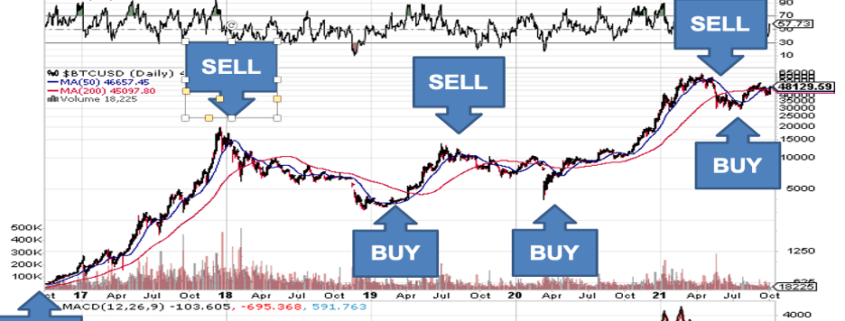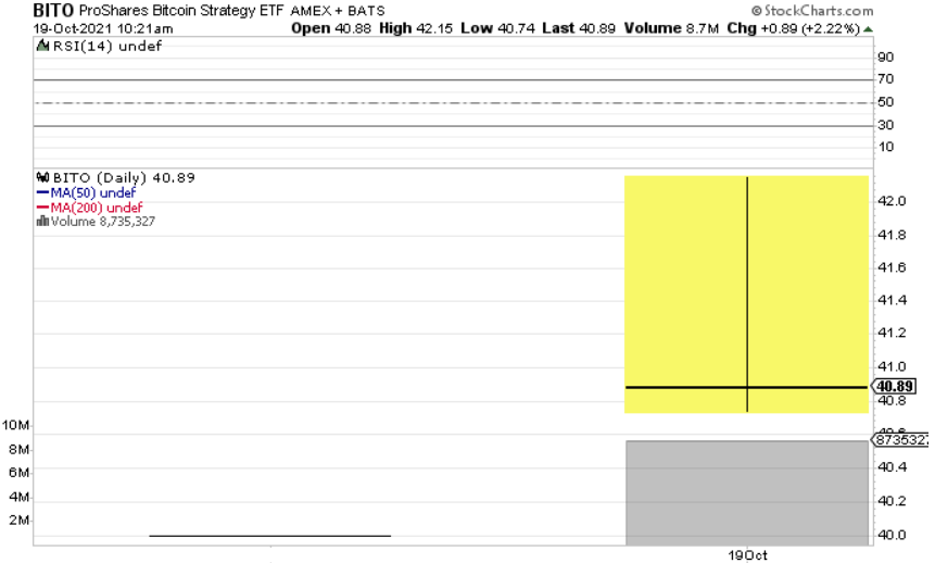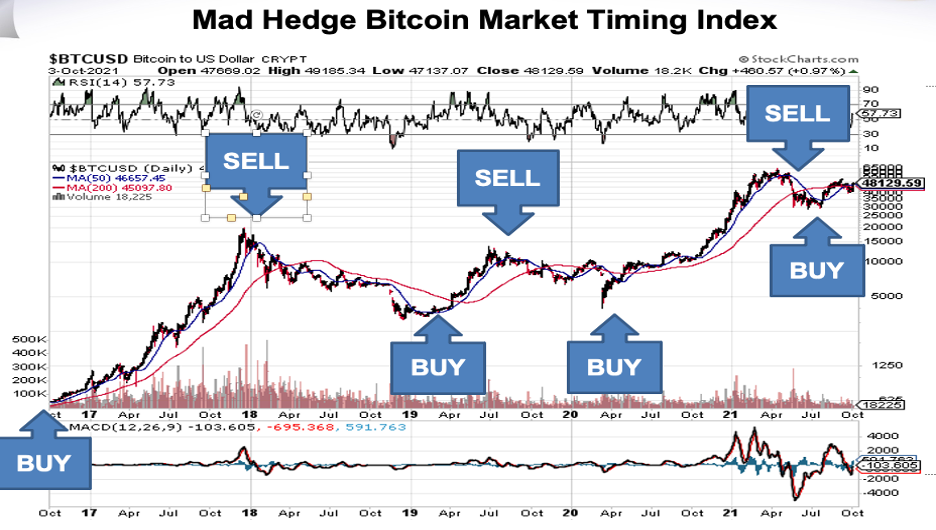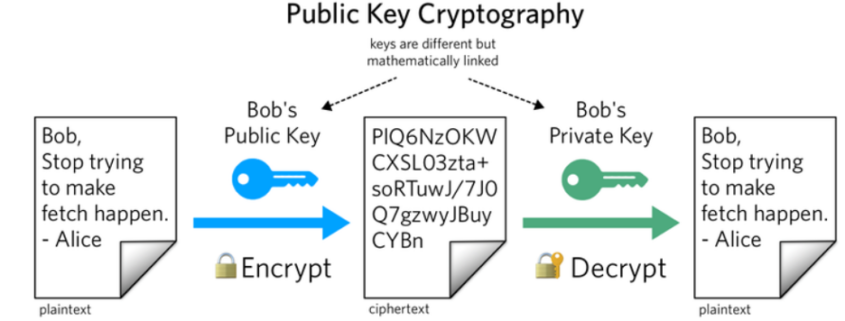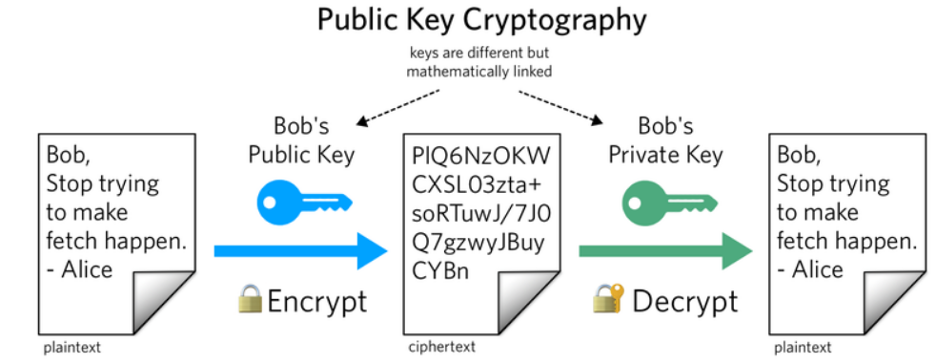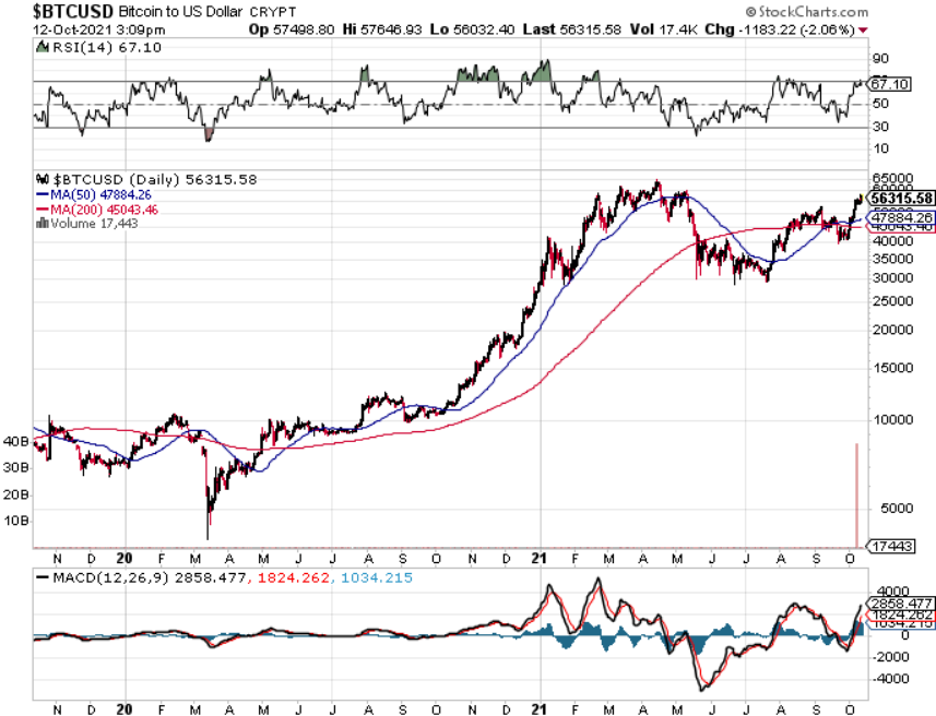“Bitcoin will be a great hedge.” – Said American Hedge Fund Billionaire Paul Tudor Jones
Mad Hedge Bitcoin Letter
October 19, 2021
Fiat Lux
Featured Trade:
(A MAJOR CATALYST FOR HIGHER BITCOIN PRICES)
(BITO)

(BITO) — remember that ticker symbol — it’s the first Bitcoin ETF listed in the U.S.
After a nearly decade-long campaign to get crypto onto a legitimate exchange — the wait is finally over.
The desire for an ETF specifically began in 2013, and in the eight years since, nervous traders have watched the Securities and Exchange Commission reject numerous applications.
“2021 will be remembered for this milestone,” says ProShares CEO Michael Sapir. For investors still on the fence about dabbling in the unregulated cryptocurrency market, he adds that his company is giving them “convenient access to Bitcoin in a wrapper that has market integrity.”
Bitcoin hit a six-month high and was within striking distance of its all-time peak giving a thumbs up to a new U.S. ETF that started trading today.
Bitcoin has risen by some 40% which could see billions of dollars managed by pension funds and other large investors flow into the sector.
ETFs are securities that track an asset and can be bought or sold on a stock exchange.
Many institutions are banned or not authorized from buying assets that aren’t insured and assets on crypto exchanges like Binance and Kraken aren’t insured by the federal government.
This definitely makes it a whole lot simpler to just open a vanilla E-trade account and pour money into a Bitcoin ETF, then ta-da, you own part of the Bitcoin story.
Not only will this benefit institutions, but retail traders will be able to sleep well at night if they decide to pull the trigger on this ETF, also the ease of buying is up there as another major bonus.
Just be aware that this fund will not invest directly in Bitcoin, rather in Chicago-traded futures, and so there won’t be a 1:1 correlation of the market price.
In general, this fortifies sentiment around any cryptocurrency asset giving a signal that adoption rates are exploding, and the future in-flow pipeline is robust.
So we have seen a rising tide lift all boats with other currencies doing well in the short-term like Ethereum.
Crypto ETFs have launched this year in Canada and Europe amid surging interest in digital assets. VanEck and Valkyrie are among fund managers pursuing U.S.-listed ETF products, although Invesco on Monday dropped its plans for a futures-based ETF.
Just take for instance Invesco QQQ ETF — which offered diversification among the top tech names at a time when investors already had the ability to invest in tech stocks.
It saw inflows of $36 billion in the ETF's first year.
I expect the same type of fund flow into this Bitcoin ETF.
From a regulatory perspective, this offers more clarity from the SEC that they are willing to accommodate Bitcoin ETFs that are tied to the Bitcoin futures.
SEC Chairman Gary Gensler recently reiterated that the crypto sector needs to be more heavily policed, and I believe this is all bark and no bite with many politicians and elites already fully invested in crypto assets.
I believe Gensler will continue to tell us how important it is to regulate the industry, but I doubt he wants to be the one that kills the golden goose that lays the golden eggs.
In other words, it’s too big to kill at this point as we surge past the $1.2 trillion market cap for all crypto assets.
Just another funny fact, Gensler once taught a class at MIT’s Sloan School of Management called “Blockchain and Money.”
We could even guestimate that Gensler is highly supportive of Bitcoin on a personal level.
Another side note, Grayscale, the world's largest digital currency manager, is planning to convert its Grayscale Bitcoin Trust into a spot bitcoin ETF, and that application was filed this morning.
If one thought this was the first and last Bitcoin ETF product to grave the public markets, let me tell you, when it rains — it pours.
All these companies understand first-mover advantage is vital.
Look at today and Invesco QQQ Trust (QQQ), the de-facto Nasdaq ETF is still one of the leaders of the tech trade.
Many involved understand, there is a big difference from becoming the 2nd Bitcoin compared to the 50th Bitcoin ETF and a race against time is happening as we speak to get products into the bloodstream.
As for investors, we just pick the winner and the first one is ProShares Bitcoin Strategy ETF (BITO).
“Be fearful when others are greedy and greedy when others are fearful.” – Said American Investor Warren Buffett
Mad Hedge Bitcoin Letter
October 14, 2021
Fiat Lux
Featured Trade:
(THE GUIDE TO PUBLIC AND PRIVATE KEYS)
(BTC)
Cryptography transcends use cases from intelligence agencies — military writing — decoding confidential text messages.
Public and private keys are an important part of Bitcoin (BTC) and other cryptocurrencies.
They allow you to send and receive cryptocurrency without requiring a third party to verify the transactions.
The basic concept behind the two-key system is the following:
- the public key allows you to receive transactions, while the private key is necessary to send transactions.
- Using two different keys (a public and a private key) is called asymmetric cryptography.
What Is a Public Key?
A public key allows you to receive cryptocurrency transactions.
It’s a cryptographic code that’s connected to a private key.
While anyone can send transactions to the public key, one needs the private key to “unlock” it and prove ownership of the cryptocurrency received in the transaction.
Therefore, freely sharing a public key is without risk.
While anyone can send the public key safely, someone would need the private key to unlock and access these sent funds.
What Is a Private Key?
A private key offers the ability to prove ownership or spend the funds associated with a public address. A private key is unique and can take many forms:
- 256 character long binary code
- 64-digit hexadecimal code
- QR code
- Mnemonic phrase
What Does It Mean to “Digitally Sign” a Transaction?
For a transaction on the blockchain to be complete, it needs to be signed. The steps for someone to send a transaction are:
- A transaction is encrypted using a public key. The transaction can only be decrypted by the corresponding private key.
- The transaction is signed using the private key confirming the transaction hasn’t been modified.
- The digital signature is generated through combining the private key with the data being sent in the transaction.
- Lastly, the transaction is verified as authentic using the accompanying public key.
Digitally signing a transaction means to prove the owner of the sent funds. Nodes check and authenticate transactions automatically. Any unauthenticated transactions get rejected by the network.
Where Are My “Private Keys?”
Private keys are in a cryptocurrency wallet, which is usually on a smartphone, desktop software or a specialized hardware device.
Private keys are not on the cryptocurrency blockchain network.
If crypto assets are held on an exchange, then the exchange is the custodian of these private keys.
How public and private keys work together is essential to understanding how cryptocurrency transacts.
Buying crypto is effectively owning a private key that proves ownership of that cryptocurrency.
Since the record is stored on the blockchain, anyone can verify the individual as the owner with a specific public key.
Just remember that deferring to a crypto exchange to hold a private key means a crypt holder trusts them with the security of protecting their crypto assets.
There is always the choice of taking custody of one’s own crypto in a hot or cold wallet.
Depending on the degree of comfort, philosophy, risk-tolerance, and amount, readers can make that decision for themselves.
Private keys are something that should never be shared.
And if one eschews their own private wallet for a custodial solution like an exchange, seek out a time-honored, trusted, dealing in large volume, and highly functional exchange instead of a marginal, half-baked exchange.
“If you like gold, there are many reasons you should like bitcoin.” — Said Founder of Gemini Cryptocurrency Exchange Cameron Winklesvoss
Mad Hedge Bitcoin Letter
October 12, 2021
Fiat Lux
Featured Trade:
(ON THE WAY TO HIGHER BITCOIN PRICES)
(BTC), (SEC), (CME)
The CEO of JP Morgan Jamie Dimon is being a bit disingenuous by saying that Bitcoin is “worthless.”
He continued to say, “I don’t want to be a spokesperson — I don’t care. It makes no difference to me. Our clients are adults. They disagree. That’s what makes markets. So, if they want to have access to buy yourself bitcoin, we can’t custody it, but we can give them legitimate, as clean as possible, access.”
Dimon strikes me as a very “in the box” type of guy and I understand this mentality makes it hard for his brain to fathom a digital currency run by software that is running simultaneously outside the U.S. financial system.
Yeh — it’s a lot to process Jamie — I get it…the uncertainty and the uncertainty of maybe JP Morgan being adversely affected by this keeps him up at night.
I mean what does Dimon have to gain from this when he has made his career off the backs of American taxpayers paying and depositing into the U.S. financial system propped up by the precipitously devalued U.S. dollar which crypto was borne out of?
Dimon’s risk-reward ratio of getting into crypto ecosystem is mind-numbingly poor at this point, better for him to take the Charlie Munger approach and claim crypto as “snake oil” from his golden perch.
Better for him to retire out to his Colonial Revival mansion in the Hampton’s and sip on mimosas at Sunday brunch.
Dimon also said that bitcoin has “no intrinsic value.”
And although he thinks bitcoin will be around long term, “I’ve always believed it’ll be made illegal someplace, like China made it illegal, so I think it’s a little bit of fool’s gold.
China has also made Amazon and Google de facto illegal by effectively banning them from Mainland Chinese internet, so are we going by Chinese law now?
He says there is no intrinsic value but look at stable coins which are a type of cryptocurrency that offer yields on holding the coin which is highly profitable.
Stable coins are doing WHAT BANKS SHOULD BE DOING.
This whole crypto thing is obviously a little over Dimon’s head which is ok.
And increased regulation will and should happen — it’s in the works and it just doesn’t happen in 6 hours — and yes, it certainly will mean higher Bitcoin prices because of a lower systemic risk after effect.
Federal Reserve Chairman Jerome Powell clarified at the end of September that he has no intention to ban bitcoin in the U.S.
If people want crypto to become more of a mainstream asset, then clearly, regulation is a necessary first step.
Dimon, if like he says — “regulators are going to regulate the hell out of it.” — regulators are doing this because they want to elevate it to a mainstream asset where banks like JP Morgan can charge customers an arm and a leg for custody and levy other fees.
And yes, too much regulation could stifle crypto innovation in the U.S. and push business overseas, this is also certainly another risk.
Ironically enough, the positive shift in sentiment toward Bitcoin can be attributed to recent statements from the United States Securities and Exchange Commission Chairman Gary Gensler suggesting the long-awaited approval of the first Bitcoin exchange-traded fund (ETF) in the U.S. may be just around the corner.
Institutional investors are continuing to pile into Bitcoin as we speak despite prices pushing up to a five-month high.
According to the latest data, more than $226 million in capital flowed to institutional Bitcoin products this past week.
Bitcoin products dominated inflows for the third consecutive week, posting a week-over-week increase of 227%.
Crypto investment products have now posted inflows for eight weeks in a row.
While the SEC has previously shot down every application it has received for physically backed Bitcoin ETFs, the SEC is currently deliberating four applications for exchange-traded funds based on the Chicago Mercantile Exchange’s (CME) regulated futures contracts.
With CME’s futures markets offering a product that is already insured and overseen by U.S. regulators, experts believe that Bitcoin futures ETFs are “likely on schedule” to receive a regulatory green light this month.
This is all highly bullish for Bitcoin and other cryptocurrencies.
““DeFi boom is a very near equivalent of an apocalyptic event for the traditional financial institutions.” — Said Indian Author Mohith Agadi
Legal Disclaimer
There is a very high degree of risk involved in trading. Past results are not indicative of future returns. MadHedgeFundTrader.com and all individuals affiliated with this site assume no responsibilities for your trading and investment results. The indicators, strategies, columns, articles and all other features are for educational purposes only and should not be construed as investment advice. Information for futures trading observations are obtained from sources believed to be reliable, but we do not warrant its completeness or accuracy, or warrant any results from the use of the information. Your use of the trading observations is entirely at your own risk and it is your sole responsibility to evaluate the accuracy, completeness and usefulness of the information. You must assess the risk of any trade with your broker and make your own independent decisions regarding any securities mentioned herein. Affiliates of MadHedgeFundTrader.com may have a position or effect transactions in the securities described herein (or options thereon) and/or otherwise employ trading strategies that may be consistent or inconsistent with the provided strategies.



